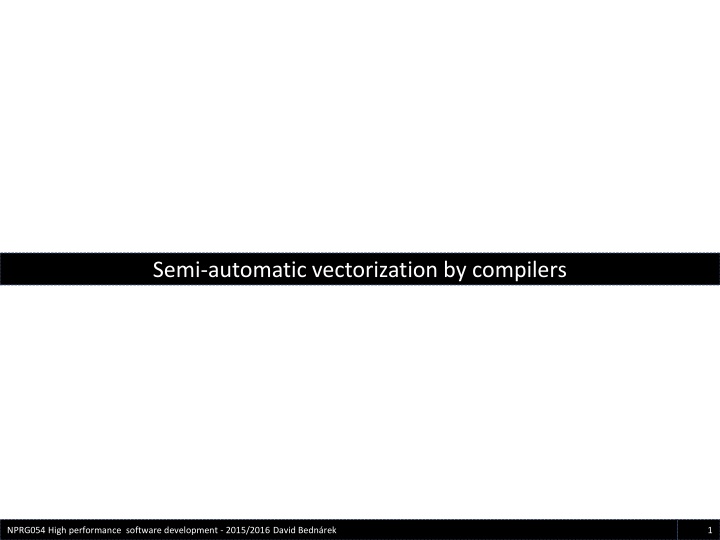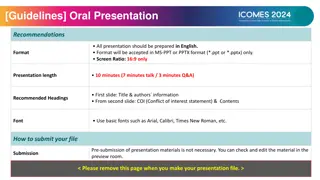
Automatic Vectorization by Compilers for High Performance Software Development
"Explore the concept of semi-automatic vectorization by compilers for optimizing software performance. Understand the loop unrolling and parallel execution techniques, loop control variable predictability, and loop-carried dependence constraints."
Download Presentation

Please find below an Image/Link to download the presentation.
The content on the website is provided AS IS for your information and personal use only. It may not be sold, licensed, or shared on other websites without obtaining consent from the author. If you encounter any issues during the download, it is possible that the publisher has removed the file from their server.
You are allowed to download the files provided on this website for personal or commercial use, subject to the condition that they are used lawfully. All files are the property of their respective owners.
The content on the website is provided AS IS for your information and personal use only. It may not be sold, licensed, or shared on other websites without obtaining consent from the author.
E N D
Presentation Transcript
Semi-automatic vectorization by compilers NPRG054 High performance software development - 2015/2016 David Bedn rek 1
Semi-automatic vectorization by compilers for (i=0; i < N; ++i) { a[i] = b[i] + c[i]; } for (i=0; i + 3 < N; i += 4) { a[i] = b[i] + c[i]; a[i+1] = b[i+1] + c[i+1]; a[i+2] = b[i+2] + c[i+2]; a[i+3] = b[i+3] + c[i+3]; } for (; i < N; ++i) { a[i] = b[i] + c[i]; } for (i=0; i + 3 < N; i += 4) { _mm_storeu_ps(a+i, _mm_add_ps( _mm_loadu_ps(b+i), _mm_loadu_ps(c+i))); } for (; i < N; ++i) { a[i] = b[i] + c[i]; } Compilers can vectorize loops Unroll the loop by K iterations Perform the unrolled K iterations in parallel by vector instructions ... but only if some conditions are met NPRG054 High Performance Software Development- 2016/2017 David Bedn rek 2
Semi-automatic vectorization by compilers for (i=0; i < N; ++i) { a[i] = b[i] + c[i]; } for (i=0; i + 3 < N; i += 4) { a[i] = b[i] + c[i]; a[i+1] = b[i+1] + c[i+1]; a[i+2] = b[i+2] + c[i+2]; a[i+3] = b[i+3] + c[i+3]; } for (; i < N; ++i) { a[i] = b[i] + c[i]; } for (i=0; i + 3 < N; i += 4) { _mm_storeu_ps(a+i, _mm_add_ps( _mm_loadu_ps(b+i), _mm_loadu_ps(c+i))); } for (; i < N; ++i) { a[i] = b[i] + c[i]; } The loop control variable and the condition must be predictable Instead of checking the condition for every i, a modified condition is tested for every K-th i Compilers often require countable loops The number of iterations must be known (at runtime) before entering the loop Compilers have a built-in list of countable loop patterns The source code must match one of these patterns NPRG054 High Performance Software Development- 2016/2017 David Bedn rek 3
Semi-automatic vectorization by compilers for (i=0; i < N; ++i) { s = s + a[i]; } for (i=0; i < N; ++i) { a[i+1] = a[i] + 1; } a = b + 1; for (i=0; i < N; ++i) { a[i] = b[i] + c[i]; } There shall be no loop-carried dependence An iteration must not depend on the result of previous iterations, e.g.: Via a variable Via array positions overlapped by index arithmetics Via overlapping arrays (aliasing) NPRG054 High Performance Software Development- 2016/2017 David Bedn rek 4
Semi-automatic vectorization by compilers Compilers can solve possible loop-carried dependences i=0; if ( (a<=b || a>b+3) && (a<=c || a>c+3) ) { for (; i + 3 < N; i += 4) { _mm_storeu_ps(a+i, _mm_add_ps( _mm_loadu_ps(b+i), _mm_loadu_ps(c+i))); } } for (; i < N; ++i) { a[i] = b[i] + c[i]; } Test overlapping arrays before entering the loop Additional small overhead NPRG054 High Performance Software Development- 2016/2017 David Bedn rek 5
Semi-automatic vectorization by compilers What a loop may do to be useful... Find something and break early Unpredictable condition Accumulate some value in a variable Loop-carried dependence via a variable Generate an output array It might overlap an input array potential loop-carried dependence In C/C++, almost no loop can be vectorized as is In Fortran, there is no pointer arithmetics less danger of aliasing The vectorized code can not be strictly equivalent to the original Order of operations must be changed The programmer must help the compiler somehow Often using a pragma that overrides the conservative approach of the compiler The programmer is now responsible for correctness of the vectorization The programmer ensures the absence of aliasing NPRG054 High Performance Software Development- 2016/2017 David Bedn rek 6
Semi-automatic vectorization by compilers Note: This code is not strictly equivalent in parallel environment But the same is true for any vectorization due to reordering of memory accesses Non-sequentially-equivalent memory models defined in modern parallel programming languages allow to ignore the problem for (i=0; i < N; ++i) { if ( a[i] < b[i] ) b[i] = b[i] - a[i]; else a[i] = a[i] b[i]; } for (i=0; i < N; ++i) { c = a[i] < b[i]; x = b[i] - a[i]; y = a[i] b[i]; b[i] = c ? x : b[i]; a[i] = c ? a[i] : y; } Vector instructions do not support branching No nested loops allowed If-then-else allowed only if it can be replaced by masking Both branches are executed for every iteration The result of one branch is masked, i.e. forgotten Like a conditional expression without short-circuit evaluation If one of the branches is significantly larger, the code may execute too many unused computations NPRG054 High Performance Software Development- 2016/2017 David Bedn rek 7
Semi-automatic vectorization by compilers for (i=0; i < N; ++i) { a[ b[ i]] = c[ i]; } for (i=0; i + 15 < N; i += 16) { _mm512_i32scatter_ps( a, _mm512_loadu_epi32(b+i), _mm512_loadu_ps(c+i), 4); } for (; i < N; ++i) { a[ b[ i]] = c[ i]; } Non-contiguous memory access is slow or impossible AVX2 supports gather a[i] = b[c[i]] AVX-512 supports scatter a[b[i]] = c[i] Scatter/gather is significantly slower than continuous load/store However faster than scalar memory access Scatter is guaranteed to perform writes in the order of increasing lane index i Applies to overlapping write positions. Non-overlapping positions may be written in any order. Compiler support is only experimental NPRG054 High Performance Software Development- 2016/2017 David Bedn rek 8
Semi-automatic vectorization by compilers for (i=0; i < N; ++i) { ++a[ b[ i]]; } auto ones = _mm512_set1_epi32(1); for (i=0; i + 15 < N; i += 16) { auto bb = _mm512_loadu_epi32(b+i); auto aa = _mm512_i32gather_epi32( a, bb, 4); auto aa1 = _mm512_add_epi32( aa, ones); _mm512_i32scatter_ps( a, bb, aa1, 4); } for (; i < N; ++i) { ++a[ b[ i]]; } Example: Histogram creation The vectorized code is not equivalent If an index j is present more than once in the vector bb, the result value is incremented only once The fact that scatter operates in a guaranteed order does not help Loop-carried dependence in the original code, between writes and subsequent reads from the same a[j] The compiler shall never ignore this dependence Remedy: Explicitly check for the repeated indexes using the AVX512CD extension NPRG054 High Performance Software Development- 2016/2017 David Bedn rek 9
Semi-automatic vectorization by compilers *conflict* instruction (AVX512) compares all pairs of lanes for equality triangular matrix returned as i bits in lane i bit j in lane i set if j < i && a[i]==a[j] conflict handling detect conflicts (cc) do the required action for lanes having no conflict bit set (m) clear the lowermost conflict bits (these are at the positions just processed) repeat if some conflict bits remain (cm) auto ones = _mm512_set1_epi32(1); for (i=0; i + 15 < N; i += 16) { auto bb = _mm512_loadu_epi32(b+i); // compute conflicts auto cc = _mm512_conflict_epi32(bb); auto cm = _mm512_test_epi32_mask(cc, cc); auto m = _knot_mask16(cm); for (;;) { // do original action masked by m (where necessary) auto aa = _mm512_mask_i32gather_epi32( m, a, bb, 4); auto aa1 = _mm512_add_epi32( aa, ones); _mm512_mask_i32scatter_ps( m, a, bb, aa1, 4); // stop if there were no conflicts auto z = _kortestz_mask16_u8(cm,cm); if (z) break; // clear lowermost ones in cc (cc = cc & (cc-1)) auto cc1 = _mm512_sub_epi32(cc, ones); cc = _mm512_and_epi32(cc, cc1); // setup new masks auto cm1 = _mm512_test_epi32_mask(cc, cc); m = _kxor_mask16(cm1, cm); cm = cm1; }; } for (; i < N; ++i) { ++a[ b[ i]]; } NPRG054 High Performance Software Development- 2016/2017 David Bedn rek 10
Semi-automatic vectorization by compilers Compiler does not know the alignment of pointers ar = (uintptr_t)a % 16; br = (uintptr_t)b % 16; cr = (uintptr_t)c % 16; if ( ar == br && ar == cr ) { for (; i < (16 ar) % 16 / 4; ++i) { a[i] = b[i] + c[i]; } for (; i + 3 < N; i += 4) { _mm_store_ps(a+i, _mm_add_ps( _mm_load_ps(b+i), _mm_load_ps(c+i))); } } else for (i=0; i + 3 < N; i += 4) { _mm_storeu_ps(a+i, _mm_add_ps( _mm_loadu_ps(b+i), _mm_loadu_ps(c+i))); } It must emit slow unaligned loads/stores It may generate tests to check whether all pointers are aligned Overhead introduced into the code The situation improved since AVX Non-aligned load/stores do not cause faults, only longer latency The compilers may produce optimistic code without test for alignment Applies also for SSE instructions when encoded in VEX encoding (available on AVX-aware CPUs) for (; i < N; ++i) { a[i] = b[i] + c[i]; } -mavx makes SSE faster! NPRG054 High Performance Software Development- 2016/2017 David Bedn rek 11
Semi-automatic vectorization by compilers C/C++ vectorization pragmas Placed before the loop to be vectorized #pragma simd #pragma vector always #pragma clang loop vectorize(enable) Override compiler's decision that vectorizing is possible but not advantageous Often issues warning/error if vectorization failed #pragma novector Disable vectorization #pragma loop count(1000) Override compiler's estimation of number of iterations NPRG054 High Performance Software Development- 2016/2017 David Bedn rek 12
Semi-automatic vectorization by compilers C/C++ vectorization pragmas Placed before the loop to be vectorized #pragma ivdep #pragma GCC ivdep Tell the compiler that there are no unprovable loop-carried dependences (via aliasing) Compiler still checks for provable loop-carried dependences (via scalars or index arithmetics) restrict [C99] Declare that a pointer argument is not aliased to any other pointer with the keyword #pragma vector aligned Tell the compiler that pointers are always aligned _declspec(align(16)) __attribute__((aligned(16))) Enforce alignment of variables, assert alignment of pointers NPRG054 High Performance Software Development- 2016/2017 David Bedn rek 13
C/C++ vectorization pragmas Reduction operators #pragma simd reduction(+:s) for (i=0; i < N; ++i) { s = s + a[i]; } NPRG054 High Performance Software Development- 2016/2017 David Bedn rek 14






















